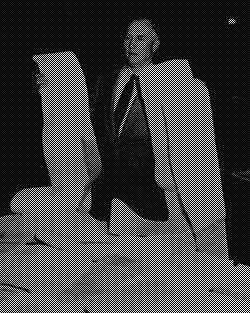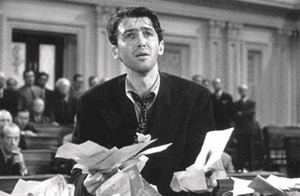Ghost Filibuster Haunts Climate Action
Air Date: Week of February 19, 2010

Strom Thurmond spoke for twenty-four hours and eighteen minutes during a filibuster against passage of the Civil Rights Act of 1957. (Courtesy of the Strom Thurmond Institute.)
Read-your-grandma's-chicken-recipe filibusters no longer hold the Senate floor, but their threat routinely holds up plans to legislate ambitious action on problems like climate change. Lawyer Tom Geoghegan is a self-described contrarian. He tells host Jeff Young that the 60-vote supermajority required to stop a filibuster is undemocratic and bad for the planet.
Transcript
YOUNG: Now, perhaps the biggest hurdle to U.S. and international action on climate change is in the U.S. Senate. Senate supporters of a cap on carbon emissions can’t get the votes to overcome a filibuster. The filibuster is an odd tradition in American politics, romanticized by Jimmy Stewart in Frank Capra’s classic, “Mr. Smith Goes to Washington”.
STEWART: And I’m gonna stay right here and fight for this lost cause even if this rooms gets filled with lies like these… somebody will listen to me, some—(collapse, scream).
YOUNG: That was then – today, arcane rule changes mean that it takes a supermajority of 60 votes to move just about any major bill through the Senate. Thomas Geoghegan calls that a “ghost filibuster” and says it’s blocking progress on problems like climate change. Mr. Geoghegan’s a Chicago lawyer and author who made his own run or Congress as a progressive Democrat. His latest campaign is against the filibuster.
GEOGHEGAN: Jimmy Stewart would be against the filibuster as it's practiced today because there’s no talking filibuster anymore in which you read your grandmother’s chicken recipe, and you brought out the cots, and you stayed all night in the Senate. In the 1970’s the filibuster was reformed and revised so it only took 60 votes and democratic leaders allowed the opposition to filibuster by saying that they would like to filibuster, but not actually going through the motions of shutting down the Senate in the hysterical way that Jimmy Stewart does in the clip.

Jimmy Stewart as Senator Smith in his last minutes on the Senate floor.
And, you know, Jimmy Stewart wasn’t arguing for a supermajority, he tried to get the country to rally around him – that’s not what it’s being used for anymore, it’s not being used for voice – nobody’s talking! It’s to simply shut down the ability of the majority to govern. So, that today, we’re suddenly in this 60-40-vote regimen, which is a modern development not part of the history of this country and not in the constitution.
YOUNG: What is this filibuster, as it is now, this supermajority requirement for everything – what does that mean for legislation on climate change?
GEOGHEGAN: It means we aren’t going to have any. As long as there’s a supermajority rule, and you know, the 40 Senators from the 20 smallest states in this country represent a population base of 11 percent. Potentially, you could have a measure designed to save the planet that is really stopped by 11 percent of the population of the country.
And there is a real serious question whether states like Montana, Utah, North Dakota, South Dakota ought to have a veto on things that are going to affect people in the sub-Sahara, in South America, in Europe. It would be an odd fate for planet Earth to go down the drain because developers in Montana don’t particularly like CO2 emission legislation.
YOUNG: Why shouldn’t something as important as addressing climate change, and let’s face it, dramatically altering our whole system of getting energy – why shouldn’t that require a supermajority?
GEOGHEGAN: Well, as Hamilton in Federalist No. 75 said, the history of every political establishment in which the supermajority has prevailed has a history of impotence, perplexity, and disorder. We can’t have government govern unless we have a government capable of acting based on majority rule. And it’s not just climate change. I can’t think of an environmental issue where the filibuster rule isn’t toxic to what environmental groups want to achieve.
YOUNG: I can think of some instances where the filibuster was championed as a way to gain environmental protection. We’d probably be drilling for oil in the Arctic National Wildlife Refuge now if not for filibuster that stopped that action.
GEOGHEGAN: Well, filibusters have stopped all sorts of terrible things, but filibusters discredit, in particular, progressive administrations that are committed to environmental quality. And when those progressive administrations are thrown out, discredited by the filibuster, low and behold people on the progressive left say, how wonderful the filibuster is because now we have it to stop the administration that got in because our own policies were discredited by the filibuster. It makes no sense.
That’s why we have two United States that show up at Copenhagen. The one United States is the United States that is concerned about global warming. And then there is the faux, or virtual United States as represented by the Senate where North Dakota has the same votes as California, and that United States seems bizarrely out of sync with the real United States; unconcerned about the issue, focused on developing western mining rights, and just not clued-in to what’s happening on the planet. It’s just frightening!

Strom Thurmond spoke for twenty-four hours and eighteen minutes during a filibuster against passage of the Civil Rights Act of 1957. (Courtesy of the Strom Thurmond Institute.)
YOUNG: You know, I do recall though that it wasn’t that long ago – the early 70s – when landmark environmental legislation passed with broad majority support from both parties.
GEOGHEGAN: Sure, of course. There was no filibuster rule. And generally the country was just much more liberal then. And the country was more liberal then because there was majority rule in the Senate with the look of a great society. It could never happen today with the filibuster. So when these laws were passed – civil rights laws, Medicare, and so forth – laws that couldn’t be passed today, they changed the culture of the country. The country moved in a more progressive direction.
YOUNG: Well, what do you think would happen if filibusters had to be good-old-fashioned filibusters?
GEOGHEGAN: Well, I’m all in favor of that. If this is a rule of obstruction then let them obstruct. If they want to shut down the administration, let them shut down the Senate. Let them see the Senate debate for three months though – I mean people would get disgusted very fast. The only reason the filibuster is so effective right now is that nobody ever filibusters.
If this country were aware as to how the invisible procedural filibuster process really works, we’d get rid of it overnight. The one thing that is keeping it in place is that not one Senator feels any heat from this issue and as long as they feel no heat I can assure this audience that the planet’s going to continue heating up.
YOUNG: Lawyer and progressive democrat Tom Geoghegan, thanks very much.
GEOGHEGAN: You're welcome.
Living on Earth wants to hear from you!
Living on Earth
62 Calef Highway, Suite 212
Lee, NH 03861
Telephone: 617-287-4121
E-mail: comments@loe.org
Newsletter [Click here]
Donate to Living on Earth!
Living on Earth is an independent media program and relies entirely on contributions from listeners and institutions supporting public service. Please donate now to preserve an independent environmental voice.
NewsletterLiving on Earth offers a weekly delivery of the show's rundown to your mailbox. Sign up for our newsletter today!
 Sailors For The Sea: Be the change you want to sea.
Sailors For The Sea: Be the change you want to sea.
 The Grantham Foundation for the Protection of the Environment: Committed to protecting and improving the health of the global environment.
The Grantham Foundation for the Protection of the Environment: Committed to protecting and improving the health of the global environment.
 Contribute to Living on Earth and receive, as our gift to you, an archival print of one of Mark Seth Lender's extraordinary wildlife photographs. Follow the link to see Mark's current collection of photographs.
Contribute to Living on Earth and receive, as our gift to you, an archival print of one of Mark Seth Lender's extraordinary wildlife photographs. Follow the link to see Mark's current collection of photographs.
 Buy a signed copy of Mark Seth Lender's book Smeagull the Seagull & support Living on Earth
Buy a signed copy of Mark Seth Lender's book Smeagull the Seagull & support Living on Earth

